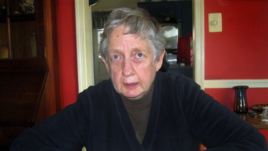CHRISTOPHER CRUISE: Welcome to THIS IS AMERICA in VOA Special English. I'm Christopher Cruise.
JUNE SIMMS: And I'm June Simms. This week on our program, we learn about the international movement for plain language. The aim is to make information easier to understand. And, later, we look at storytelling in the modern age.
(MUSIC)
CHRISTOPHER CRUISE: Have you ever received an important notice or other document that you could not understand because it was poorly written? Plain language activists around the world know all about that problem. They say people deserve to have materials like tax forms, legal documents and financial statements written clearly and understandably.

JUNE SIMMS: Last month, some of the world's leading experts on plain language gathered in Washington for the Clarity 2012 conference. Clarity is an international group of lawyers and other professionals. Their common goal is removing needlessly complex language from legal writing.
This was Clarity's fifth international conference. The association began about 30 years ago and now has 650 members in 50 countries.
Clarity focuses on legal writing. But there are other organizations that provide tools and guidance for plain language in business and government. Among them is the Center for Plain Language in Washington. Annetta Cheek is chairwoman of the center.

ANNETTA CHEEK: "Our goal is to get government and business to speak more clearly, to write more clearly to citizens and customers. Because we think that unclear communication -- confusing, bureaucratic, legalistic communication is beyond annoying. It can be harmful to people that don't understand important information that affects their financial life, their security and what have you."
CHRISTOPHER CRUISE: In 2010, Congress passed and President Obama signed the Plain Writing Act. This law requires the federal government to use plain language in newly written public documents such as letters, forms and publications. Ms. Cheek says some progress is being made.
ANNETTA CHEEK: "There is certainly a lot of movement, but it's the government. Writing all that material in plain language is going to take a long time."
She points out that other countries have also taken steps to adopt plain language measures.
ANNETTA CHEEK: "Sweden has the oldest government-wide plain language program. They started a program I think in the late 1970s, and I've been told that it's difficult to find a top-level government document in Sweden that's hard to understand."
Other countries including Norway, Australia, Canada and South Africa are also making efforts to use plain language more in public documents. However, Ms. Cheek says there has not been as much activity in the use of plain language in Asia and the Middle East.
JUNE SIMMS: Christopher Balmford is an expert in clear legal writing and the managing director of Words and Beyond in Australia. He says the issues involved in making English easy to understand are the same as for other languages throughout the world.
CHRISTOPHER BALMFORD: "There's not a language where the people like their sentences to be really long. There's not a language where people like writers to use words that they don't understand. These things are intuitive, cross-cultural."
CHRISTOPHER CRUISE: One problem is that some common words may not mean the same thing to the general public as they do to a lawyer. Mr. Balmford says a big part of writing clearly is considering who you are writing for.
CHRISTOPHER BALMFORD: "We need to make sure we use words that put the right pictures in people's minds. And too often traditional legal drafting uses words that won't put the right pictures in people's minds that create these miscues."
JUNE SIMMS: Take the word "instruments." For most people, the word brings to mind pianos, guitars and drums. But not for lawyers.
CHRISTOPHER BALMFORD: "If you say it to lawyers, they think about mortgages, and deeds and debenchers because those documents are what's known as legal instruments."
The process of adopting plain language practices is not always easy for an organization, or an individual.
CHRISTOPHER BALMFORD: "It's easy to write the way you've always written, so making the change is hard. It's probably harder to write in plain language because you need to think deeper and harder about what you're saying."
Christopher Balmford says resistance often comes from lawyers who are concerned that changes in their writing could change the meaning of their documents. But he says more lawyers are moving in the right direction in several countries including Australia, the United Kingdom and Canada.
CHRISTOPHER CRUISE: So imagine you have a document that you want to rewrite using plain language. Where is the best place to begin?
CHISTOPHER BALMFORD: "The very best place to start, and it's the best place to end as well, is to find out what current users of the document think."
This is known as document testing or usability testing, and you can learn more about this process on the Internet. You can also find other resources online and in books to learn about writing in plain language.
In English, for example, using the active voice can make a sentence clearer than using the passive voice. The website plainlanguage.gov gives some examples. Here is a sentence in passive voice: "The lake was polluted by the company." Now here it is in active voice: "The company polluted the lake." Another example: "New regulations were proposed" is passive voice. You can make that into active voice by simply writing: "We proposed new regulations."
Now what about this next sentence -- is it active voice or passive voice? Here it is: "The following information must be included in the application for it to be considered complete." That was passive voice. Here it is rewritten into active voice: "You must include the following information in your application."
Mr. Balmford says using more informative headings, graphics and images can also help make a document easier to understand.
JUNE SIMMS: Annetta Cheek at the Center for Plain Language helped get the Plain Writing Act passed in 2010. She says everyone shares in the responsibility for the clarity of the language they get from their government and businesses.
ANNETTA CHEEK: "Don't just accept bad communication. Complain about it. Say that you think as a customer or a citizen you have a right to clear communication. Demand that those organizations communicate clearly with you."
(MUSIC)
CHRISTOPHER CRUISE: In an age of video games and the Internet, storytelling is a tradition that remains entertaining and educational even after thousands of years. Storytelling was first developed to pass knowledge from one generation to another. Storytellers use the human voice as well as facial and body movements to make the spoken word compelling.
LINDA GORHAM: "Hup two three four, hup two three four. You can try it with me; hup two three four, hup two three four..."
JUNE SIMMS: Linda Gorham is a storyteller. Her stories, like this one called The Fat Cat, come alive through sounds, rhythms and the repetition of words.
LINDA GORHAM: "And cat says, I'm a fat cat, a real fat cat and I'm really hungry, how about that, Huh."
In The Fat Cat, a hungry cat is never satisfied. Here, Ms. Gorham is performing the story before more than 100 children in a Virginia community center. Her audience is having fun.
CHILD ONE: "It was very creative. And I never heard of the story before. It sounded very cool."
CHILD TWO: "I did like that you can, like imagine it, instead of looking at the pictures of the book."
Ms. Gorham says storytelling is a powerful teaching tool.
LINDA GORHAM: "I call it teaching without preaching. I don't tell a story and then at the end say now here is what you needed to learn. The message should be in the story. If the story is well crafted, you're going to get it."
CHRISTOPHER CRUISE: Linda Sullivan is president of the Arts Council of Virginia's Fairfax County. The council organizes storytelling performances for school children throughout the county.
LINDA SULLIVAN: "They learn by being engaged. They are not just being talked to, but asked to respond and participate."
LINDA GORHAM: "I want you to try this with me. Ok, ready? Eyes, nose, cheeky cheeky chin, cheeky cheeky chin, nose eyes. Again--Eyes, nose, cheeky cheeky chin, cheeky cheeky chin, nose eyes."
JUNE SIMMS: Story tellers use numerous tools including, theater, dance, and song.
GALE NEMEC: "Hey what's Up? You can't put us away. We have to celebrate Christmas. Excuse me?
And another stocking says, 'We've been waiting for 11 months.'
And another one says, 'We want to be filled with fruit and candy and toys, make girls and boys..."
Gale Nemec is also a story teller. She too was discovered by Fairfax County schools. She says her stories are like short plays and are heavy on character development.
GALE NEMEC: "If you're doing the witch, you need to change your voice and make her sound rather, oooh, witchy, and figure out what kind of motions and how her body might be. If you're doing a story which is perhaps an angel, I'd work on making it softer and smoother and, Oh, look at that wonderful thing."
CHRISTOPHER CRUISE: Ms. Nemec says stories can also help children who have learning disabilities. She says one of her stories, about elephants, helped a child who had problems with speech and language.
GALE NEMEC: "So the mommy elephant said, 'uh, what do you think we should do?' And the father elephant said, 'uh, I think we should cross to the other side of the river.' Hearing that kind of thing, the child, he started to understand that he could speak. And he started participating more, and speaking more because he was hearing this storytelling going back and forth."
Gale Nemec says storytelling can not only help with disabilities, it can enrich children's lives.
GALE NEMEC: "There is a bear on the bench wants to say hi. And each time a person passes by him, all they can see is a bear with a grin. He waits for the day when he can wave. I wave..."
Storytelling can teach children how to communicate in an engaging and persuasive way. And that is a skill for life.
(MUSIC)
JUNE SIMMS: Our program was written and produced by Brianna Blake, with reporting by Faiza Elmasry. I'm June Simms.
CHRISTOPHER CRUISE: And I'm Christopher Cruise. You can find videos about today's program on our website, voaspecialenglish.com. You can also find transcripts and MP3s of our programs, along with podcasts and activities for learning English. Join us again next week for THIS IS AMERICA in VOA Special English.
One group's fight for understandable language
Workplace stories, teen romance top novels of 2010
Jean Craighead George spent her life in the wilderness or writing about it
Maurice Sendak, 1928-2012: his imagination redefined children's literature
(來源:VOA 編輯:旭燕)
